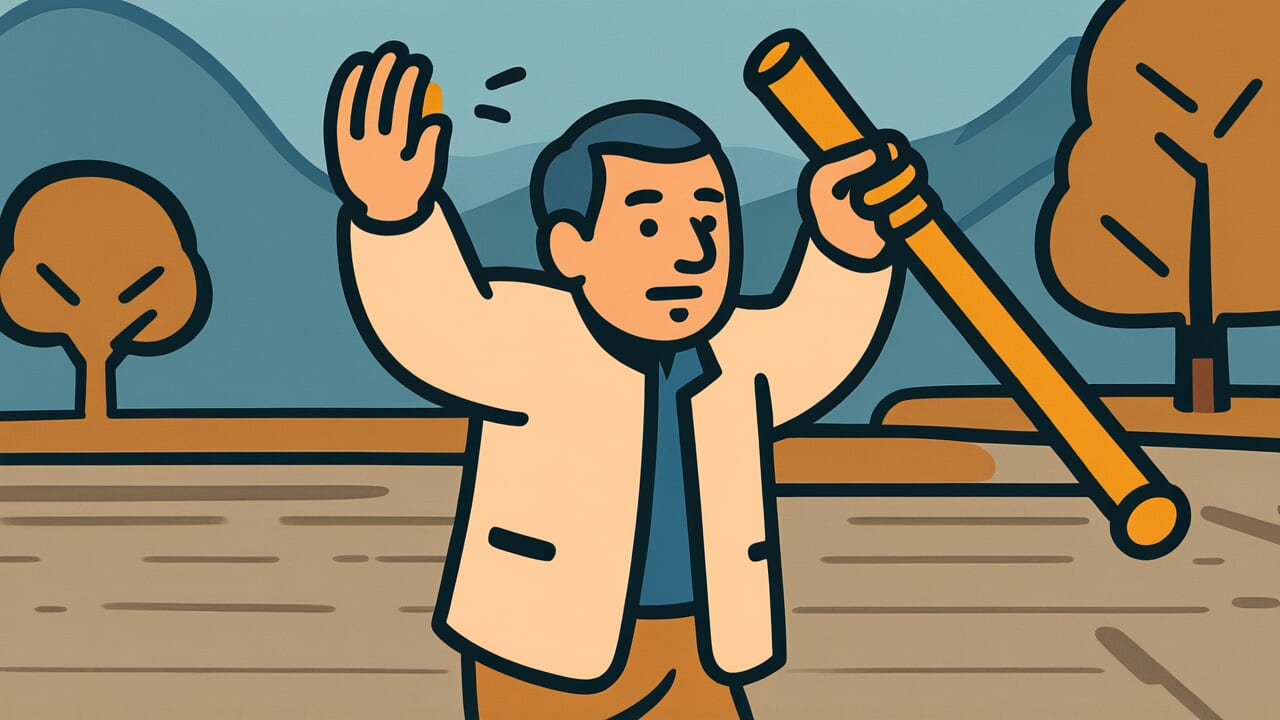How to Read “A blind man should not cast away his staff”
A blind man should not cast away his staff
[uh BLAHYND man shood not kast uh-WAY hiz staf]
Meaning of “A blind man should not cast away his staff”
Simply put, this proverb means you should never abandon something that helps you succeed or survive.
The literal words paint a clear picture. A blind person relies on their walking stick to move safely through the world. Without it, they would stumble and fall. The staff guides them around obstacles and helps them navigate unfamiliar places.
The deeper message applies to everyone’s life. We all have tools, skills, or support systems that help us succeed. These might be education, friendships, savings, or experience. When times get tough, people sometimes think about giving up these resources. This proverb warns against that mistake.
The wisdom reminds us to value what sustains us. Sometimes we take our most important resources for granted. We might not realize how much we depend on them until they’re gone. Smart people protect and maintain the things that keep them stable and moving forward.
Origin and Etymology
The exact origin of this proverb is unknown, though it appears in various forms across different cultures and time periods.
The saying reflects ancient wisdom about disability and survival. In earlier times, people with visual impairments faced greater daily challenges than today. Walking sticks were essential tools for independence and safety. Communities understood that certain tools meant the difference between self-reliance and helplessness.
Proverbs like this one spread through oral tradition before being written down. They captured practical wisdom that everyone could understand and remember. The image of a blind person with a staff was universally recognizable. This made the saying powerful and memorable across different societies and languages.
Interesting Facts
The word “staff” comes from Old English meaning a stick or rod used for support. In many cultures, walking sticks held symbolic meaning beyond their practical use. They often represented authority, wisdom, or divine guidance. The phrase “cast away” uses an old term for throwing something aside or abandoning it completely.
Usage Examples
- “I know the job market is tough, but don’t quit networking. A blind man should not cast away his staff – those connections might lead to your next opportunity.”
- “My grandmother always said to keep some money saved, even when times are good. A blind man should not cast away his staff, and emergency funds are like that staff for tough times.”
Universal Wisdom
This proverb reveals a fundamental truth about human survival and the psychology of security. Throughout history, humans have succeeded not just through individual strength, but by recognizing and preserving the tools that extend our capabilities. The wisdom speaks to our deep understanding that vulnerability is part of the human condition, and smart preparation makes the difference between thriving and merely surviving.
The saying exposes a dangerous tendency in human nature. When people feel confident or desperate, they sometimes abandon the very things that brought them stability. Success can make us overconfident, leading us to believe we no longer need our support systems. Desperation can make us sacrifice long-term security for short-term relief. Both impulses ignore the reality that circumstances change quickly and unpredictably.
What makes this wisdom universal is its recognition that everyone has limitations. We all navigate through areas where we cannot see clearly. Whether facing new challenges, unfamiliar situations, or times of stress, we rely on tools beyond our natural abilities. These might be relationships, knowledge, resources, or habits that guide us safely through uncertainty. The proverb reminds us that acknowledging our need for support is not weakness but wisdom. Those who recognize their dependencies and protect them are more likely to maintain their independence over time.
When AI Hears This
People throw away their crutches before they can walk properly. This happens when feeling better makes them forget why they needed help. The walking stick becomes embarrassing instead of useful. They worry more about looking weak than staying safe.
This pattern reveals something strange about human thinking. People confuse needing help with being failures. Independence becomes more important than actually succeeding. The tool that saved them now feels like proof they are broken. So they get rid of it to feel normal again.
What fascinates me is how this actually makes sense. Humans live in groups where image matters for survival. Sometimes looking capable is more valuable than being capable. The blind man keeps his staff not because he is wise. He keeps it because he cannot pretend to see. The rest of us can pretend a little longer.
Lessons for Today
Living with this wisdom requires honest self-assessment about what truly supports your success and well-being. The challenge lies in identifying which resources are genuinely essential versus merely convenient. Essential supports are those that would leave you significantly more vulnerable if removed. This might include your education, key relationships, financial reserves, or professional skills. Regular evaluation helps distinguish between helpful luxuries and necessary foundations.
In relationships and collaboration, this wisdom encourages mutual support and respect for others’ needs. Everyone relies on different tools and systems to function effectively. Understanding this creates empathy and prevents judgment about others’ dependencies. It also highlights the importance of being reliable support for others when possible. Strong communities form when people recognize their interconnectedness and protect the resources that benefit everyone.
The broader application involves building resilience through diversification rather than putting all trust in single solutions. While the proverb warns against abandoning essential support, it also suggests developing multiple sources of stability. This might mean maintaining various skills, nurturing different relationships, or creating backup plans. The goal is not fearful hoarding but thoughtful preparation. Those who understand their vulnerabilities and maintain appropriate supports find themselves better equipped to handle life’s inevitable changes and challenges.



Comments